
MBBS in India continues to be one of the most preferred courses for students aiming to build a career in the medical field. The term MBBS stands for Bachelor of Medicine and Bachelor of Surgery, an undergraduate program designed to provide students with both theoretical medical knowledge and hands-on clinical training. Completing an MBBS degree is considered the foundation for a medical career and is crucial for those seeking roles in clinical practice, patient care, medical research, and various other branches of healthcare.
This detailed guide explains all key aspects of MBBS in India, including eligibility requirements, course duration, syllabus structure, admission procedure, clinical exposure, and the wide range of career opportunities available after graduation.
Also Read: NRI Quota in NEET 2025
MBBS in India Details
MBBS is an undergraduate medical program of 5.5 years that trains students in diagnosing illnesses, prescribing treatments and medications, and carrying out surgical procedures. Admission to the MBBS in India is granted solely through the NEET UG examination, which serves as the mandatory entrance test for medical colleges across the country.
For a clearer understanding of the program, candidates can refer to the MBBS course details provided in the table below:
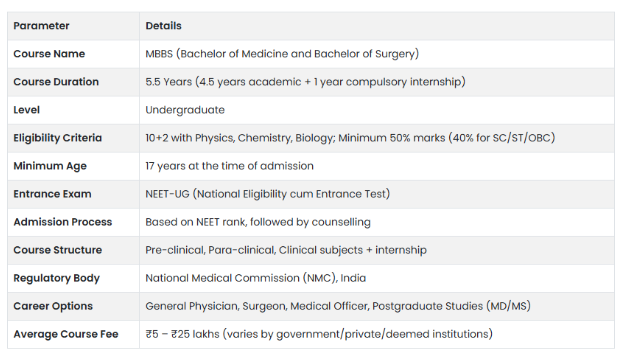
MBBS in India Duration
The duration of the MBBS program in India is generally divided into two main components:
- Academic Study: This phase involves classroom learning and theoretical instruction in various medical sciences. It usually spans 4.5 years, providing students with the essential knowledge base required for clinical practice.
- Compulsory Internship: Following the academic phase, students must complete a 1-year mandatory internship. This training period offers practical exposure in hospitals and healthcare centers, where graduates work with patients under the guidance of experienced doctors.
- Total MBBS in India Course Duration: Approximately 5.5 years (4.5 years of study + 1 year of internship).
Also Read: AIIMS Deoghar MBBS Admission Open 2025-2026
MBBS in India Eligibility Criteria
To apply for MBBS in India, candidates need to satisfy the eligibility conditions set by the National Medical Commission (NMC) and other regulatory bodies:
Academic Requirements
- Completion of 10+2 (or equivalent) from a recognized board.
- Physics, Chemistry, Biology/Biotechnology, and English must be core subjects.
- General category candidates should score at least 50% in PCB subjects.
- SC/ST/OBC candidates require a minimum of 40% in PCB.
- PwD candidates must obtain at least 45% in PCB.
Age Criteria
- Applicants must be 17 years of age or older as of December 31 of the admission year.
- As per current NMC guidelines, there is no upper age limit for NEET (subject to future changes).
Entrance Examination
- NEET-UG qualification is compulsory for MBBS in India across government, private, and deemed universities.
- Selection is based on NEET rank and the counselling process conducted by MCC or state authorities.
Nationality
- Eligible candidates include Indian citizens, NRIs, OCIs, PIOs, and foreign nationals, in accordance with the rules of respective universities and the National Medical Commission.
Category-Wise MBBS in India Eligibility Criteria
The minimum percentage required in Physics, Chemistry, and Biology/Biotechnology at the 10+2 level differs for each category. A general overview of the category-wise MBBS eligibility marks is provided in the table below:
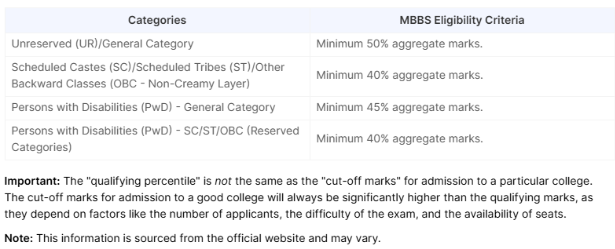
Also Read: RIMS Ranchi MBBS/MS/MD Admission Open 2025-2026
MBBS in India Entrance Exam
The National Eligibility cum Entrance Test for Undergraduates (NEET-UG), conducted by the National Testing Agency (NTA), is the only entrance exam for MBBS admissions in India. Clearing NEET is compulsory for securing a seat in government, private, deemed universities, as well as in institutions like AIIMS and JIPMER.
Key Highlights of NEET UG for MBBS in India Admission
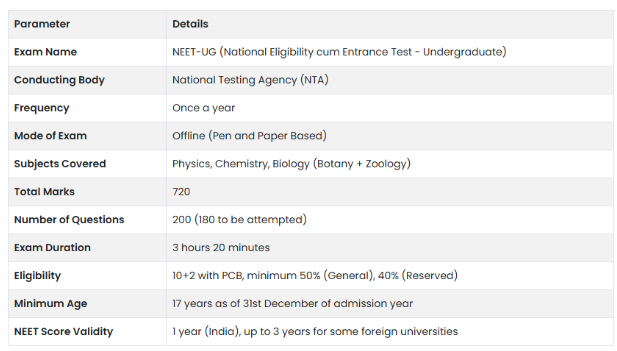
MBBS in India Syllabus
The MBBS curriculum in India follows the Competency-Based Medical Education (CBME) framework set by the National Medical Commission (NMC). The program is organized into three stages — Pre-Clinical, Para-Clinical, and Clinical — covering 4.5 years of academic study, after which students must complete a 1-year mandatory internship.
MBBS in India Year-Wise Syllabus
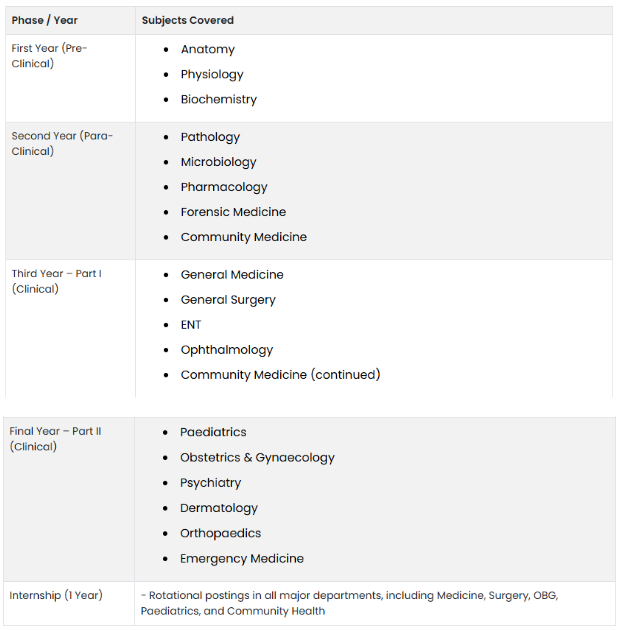
Also Read: MMU Mullana MBBS/MD/MS ADMISSION Open
MBBS in India Admission Process
The MBBS admission process in India for 2025 starts with fulfilling the eligibility criteria, which require candidates to pass Class 12 with Physics, Chemistry, Biology, and English, scoring at least 50% marks (40% for reserved categories).
The step-by-step admission procedure for MBBS in India is as follows:
Step 1: Eligibility – Completion of Class 12 with Physics, Chemistry, Biology, and English.
Step 2: NEET UG Registration – Apply online through the official NEET portal, upload documents, and pay the application fee.
Step 3: Entrance Exam – Appear for the NEET UG examination.
Step 4: Result Declaration – NEET scores are released online.
Step 5: Counselling Registration – Enroll for counselling via MCC (Medical Counselling Committee) or respective state authorities and submit college preferences.
Step 6: Seat Allotment – Allocation of seats is done based on NEET rank, reservation norms, and candidate choices.
Step 7: Document Verification – Present required documents at the allotted institution.
Step 8: Admission – Pay the admission fee and complete all necessary college formalities.
Documents Required for MBBS in India
Here’s the list of documents needed to get MBBS admission in India:
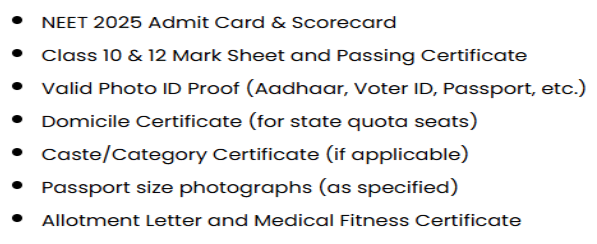
Also Read: Al Falah Medical College MBBS/MD/MS ADMISSION Open
Top Medical Colleges Offering MBBS in India
The NIRF 2024 rankings for medical institutions in India have been announced, with many of the country’s well-established colleges retaining their position among the top. The table below provides the list of leading MBBS in India colleges as per the NIRF 2024 rankings.
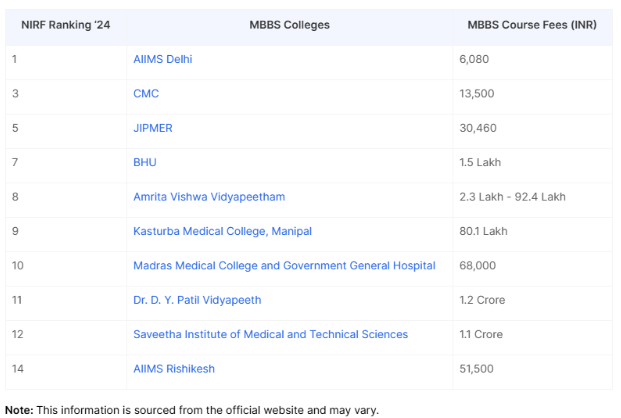
Why MBBS in India?
India is home to some of the most reputed medical universities, recognized globally for their education and training standards. With more than 300 medical institutions, including around 180 private colleges, the country offers nearly 72,000 MBBS seats every year.
Indian medical education is valued for its strong focus on research, hands-on clinical exposure, and comprehensive training programs. Students gain practical experience by working with real patients, which helps them build essential medical skills. The MBBS in India curriculum is aligned with international standards, and many institutions encourage participation in global seminars, workshops, and conferences. Graduates from Indian medical colleges are eligible to practice medicine in different parts of the world, subject to local licensing requirements.
Also Read: Smt. NHL Municipal Medical College, Gujarat MBBS/MD/MS ADMISSION Open
Contact Us

Final Words
MBBS in India is a challenging but fulfilling career path that prepares students with the medical knowledge and clinical skills needed to become professional doctors. Choosing where to study MBBS should align with your long-term career goals and personal preferences. Key factors to consider include tuition costs, recognition of the degree, teaching methodology, and career opportunities after graduation.
Regardless of location, pursuing MBBS demands dedication, resilience, and a strong commitment to patient care. If you want to secure MBBS admission in India, contact Olympia Education, as we are the best in guiding students toward their medical career goals.
Frequently Asked Questions
- What are the career options after completing MBBS in India?
After completing MBBS in India, students have a wide range of career options. They can opt for PG in various medical specializations, work as general practitioners, pursue research, or join government or private healthcare institutions.
- Is it mandatory to do the internship after completing MBBS in India?
Yes, it is mandatory for MBBS graduates to complete a one-year internship in a hospital setting after obtaining their degree. The internship provides practical experience and exposure to real medical scenarios.
- Why should Indian students choose to do MBBS in India?
Indian students should consider studying MBBS in India because of the country’s quality education, lower tuition fees compared to other countries, cultural familiarity, a wide range of specializations, and ample internship opportunities.
- Can I pursue MBBS without NEET?
In India, NEET is compulsory for admission to MBBS programs across almost all government, private, and deemed universities. While earlier some private institutions had their own entrance tests, current regulations make NEET the mandatory requirement for MBBS admission in India.
- Is there any age limit to apply for MBSS in India?
Yes, the age limit for MBBS in India is 17 years as on December 31 of the year of admission.
- Can NRI students get MBBS admission in India?
Yes, NRI students can apply for MBBS in India. Some medical colleges have specific quotas or seats reserved for NRI students. The admission process for NRI candidates may have additional requirements and may vary from college to college.
